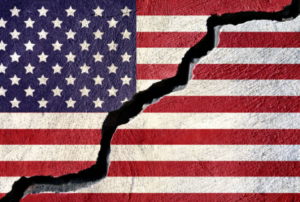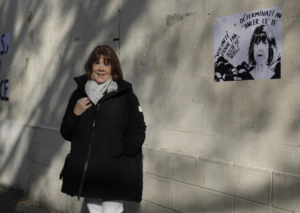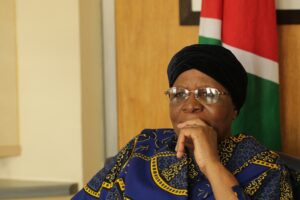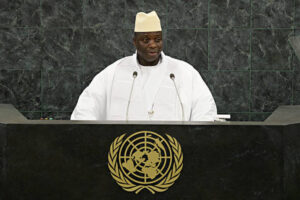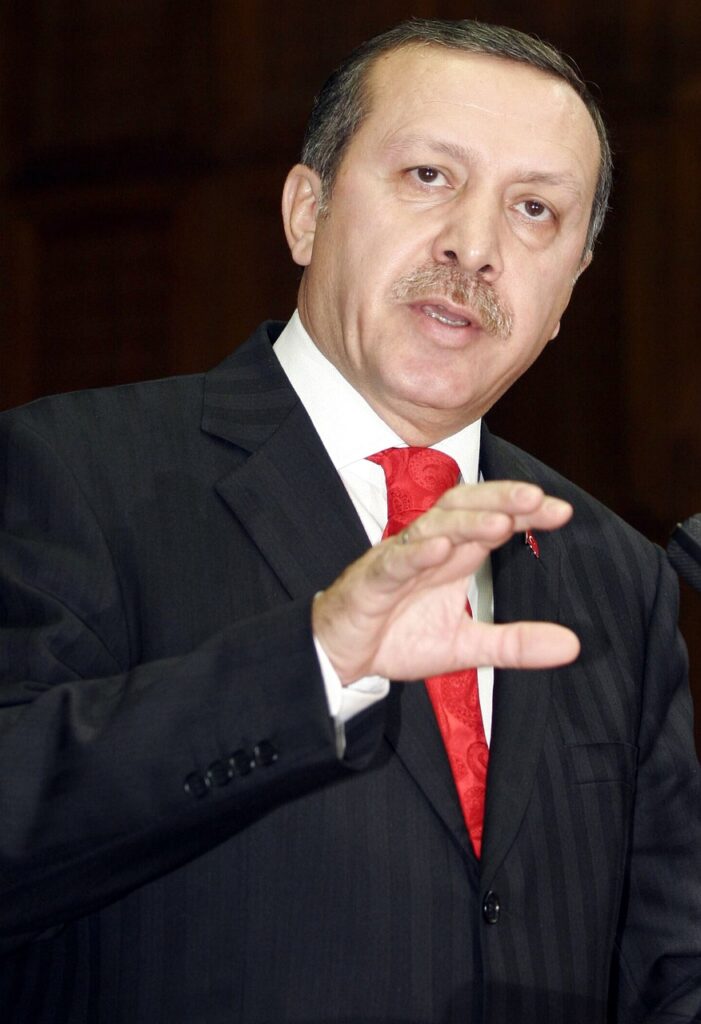The incident was first reported in the local media “Voix de Jura” before being covered by several mainstream press organs. It is claimed that a teacher at Pré Saint-Sauveur High School was placed under functional protection. An ongoing investigation led by Saint-Claude Gendermerie is opened following a legal complaint.
It is reported that the high school teacher was threatened by the mother of a 10th-grade student. This threat was due to a caricature of the Turkish President R. Tayyip Erdogan during an exhibition of press cartoons. According to the media, the student allegedly showed the caricature portraying Erdogan as a dictator to her family. Therefore, the family felt outrageous. The details of neither the happening nor the investigation are shared extensively due to legal proceedings. However, it is claimed that there has been already existing conflict between the teacher and the family of the student.
Saint-Claude is a commune in Jura which is a French department in the Bourgogne-Franche-Comté region bordering Switzerland in Eastern France. This small commune with a population of about less than 10000 residents was shocked by this incident. However, the events circulating around this caricature crisis carry a concern on a national level. Indeed the latest tragedies of Islamist terrorism hit the French educational institution not long ago.
A battle against radicalism
France has been hit with several incidents linked to Islamist radicalism which claimed hundreds of lives. The Charlie Hebdo attacks and the November 13 Paris attacks including the Bataclan massacre in 2015 during which the terrorist incidents in France had seen its peak with 36 incidents mainly in the wave of IS terror circulated in Europe.
Throughout the history of these terrorist attacks, several patterns have emerged. For example, the choice of attack, the choice of weapons such as knives, and the targets such as educators.
Even motives such as jihad or other kinds of radical ideologies may become a pattern. The relation between Charlie Hebdo’s religious caricatures, the attacks in 2015 and the murder of Samuel Paty could serve as examples.
Educators targeted by radicals
These claims of threat against a teacher in Jura revoked the painful memories in France’s recent past. Several French teachers also targeted by Islamist terrorism were brutally murdered. This was the case of the beheading of Samuel Paty in 2020 and the murder of Dominique Bernard by his former student in Arras in 2023 which traumatized the nation.
The Samuel Paty Case
Samuel Paty was murdered by an Islamist terrorist, Abdoullakh Anzorov, of Chechen origin, after he showed the caricatures of Islam’s Prophet Mohamed in class. It coincided a few weeks after the French satirical journal Charlie Hebdo republished their caricatures 5 years after the attack against the journal’s staff.
On December 20, the Assize Court of Pairs gave its verdict after a trial of seven weeks of hearings. 8 defendants were tried such as Abdoullakh Anzorov’s friends Azim Epsirkhanov and Naïm Boudaoud. The co-initiators of the online hate campaign against Samuel Paty, Abdelhakim Sefrioui who is often referred to as the one who gave “digital fatwa” and Brahim Chnina were also sentenced to 15 and 13 years. Chnina was the father of a schoolgirl who lied about Samuel Paty. She claimed that he asked Muslim students to leave the class before showing the caricatures. However, she didn’t even attend these classes.
Other defendants often referred to as members of “jihadosphere” who were in contact with the killer were also indicted. Their sentences go from 1 to 5 years. Ismail Gamaev, Louqmane Ingar, Priscilla Mangel, and Yusuf Cinar whose profiles were submitted to the court on December 5 were raised in an Islamist fundamentalist family of Turkish origin. Recently, six teenagers were tried in juvenile court for their role in the assassination of Paty.
According to the media outlets, the previous findings of the trial of the murder of Samuel Paty had pointed out a link between the killer and the Syrian Islamist group Hayat Tahrir al-Cham, HTC. They recently toppled the Bashar Al-Asad and claimed the new leader of Syria.
Why there are red flags?
The threats towards the high school teacher in Saint-Claude appear to be politically motivated given media coverage of the investigation. However, certain elements raise concerns as there are similarities with these former tragedies of French educators. For instance, the involvement of parents in the content of education is similar to the case in Sainte-Claude and Samuel Paty. Indeed, the schoolgirl reportedly lied about Samuel Paty and her father who launched the online hate campaign against the professor.
The factor of parents and their objection to the French national educational methods and curriculum reveals a deeper problem: radicalization within their families. The question is whether the French educational institutions that safeguard the principles of the Republic can win the battle against radicalism and religious extremism.
Turkey’s controversial standing after the heinous murder of Samuel Paty
Turkey’s position regarding the murder of Samul Paty was scrutinized at the time. It was marked as another diplomatic challenge in bilateral ties with France during these events.
The back-then French Foreign Minister Jean-Yves Le Drian even expressed the French state’s displeasure through a communiqué which was released on 25th October 2020, 9 days after the attack. His official statement underlined the absence of any official condemnation from the Turkish authorities concerning this terrorist attack. The statement also blamed Turkey for “hatred towards France” following the Turkish-led anti-French propaganda and the recent remarks of the Turkish President towards the French President.
— Jean-Yves Le Drian (@JY_LeDrian) October 25, 2020
Did Turkey officially condemn the terrorist attack via its high-level authorities?
Turkey was blamed for its state-level silence concerning the murder of Samuel Paty. Here’s the timeline of Turkish reactions following the attack:
On the same day of the release of the French communiqué on the 25th of October, the French Ambassador was recalled to Paris for consultations. A day after, on the 26th of October, the Turkish Foreign Ministry responded to Le Drian’s communiqué with an official statement. He blamed France for being “egocentric” and “unilateral” regarding bilateral ties. The statement mentioned Turkey’s “sadness” towards the murder of Samuel Paty. However, it emphasized once again Turkey’s opposition to caricatures. It is seen as a “double standard” in the framework of “freedom of expression” believing it offends Muslims.
This official communiqué of the Turkish side was retweeted by then-Turkish Ambassador to France, Ismail Hakki Musa. He serves as the current Turkish Ambassador to China. The former Ambassador claimed that the condolences message he tweeted on his personal Twitter (now X) account on the 18th of October, two days after the attack, also represented the Turkish state. He also shared the pictures of him laying flowers in to pay homage to Samuel Paty in Conflans-Sainte-Honorine on October 23rd on Twitter. The French Embassy to Turkey commented “Merci!” under the post.
#Turquie ne néglige en aucun cas les considérations humaines!
— Dr. İsmail Hakkı Musa (@ihakkimusa) October 26, 2020
Les condoléances que j’ai présentées le 17 octobre dernier pour #SamuelPaty sont aussi celles de l’Etat turc.
Le communiqué du @MFATurkeyFrench 👇 pic.twitter.com/twVv7WSEQP
On the same day of the Turkish communiqué, the back-then Turkish government’s spokesperson who now happens to be its intelligence chief Ibrahim Kalin, expressed Turkey’s condemnation of “the monstrous assassination” on the 10th day of Samuel Paty’s murder.
The Diplomatic Spat in 2020
The bilateral ties between the two NATO allies witnessed a number of challenges amid a tumultuous diplomatic spat in 2020. This tensions resulted from the contradiction of the foreign policies of Paris and Ankara due to Turkey’s unilateral moves in Libya, the Eastern Mediterranean, and Syria.
Caricatures as an excuse to mobilize the Muslim World against France
However, diplomatic spat escalated especially following Samuel Paty’s murder. France declared once again its commitment to protect the constitutional right to “freedom of expression”. Several initiatives by the French government to deter Islamist extremism and religious separatism were highly criticized by Turkey. It was the case for the anti-separatism law. The tensions mainly circulated around the topic « Islam » and « freedom of speech ». Turkey claimed the rhetoric of France being “Islamophobic”.
The deterioration of the diplomatic ties was heightened by the Turkish President’s controversial remarks. He called for a boycott of French products. Also, he encourages Muslim-majority countries to follow the same path of anti-French propaganda. Turkey’s strong opposition to religious caricatures like The Erdogan caricatures published by Charlie Hebdo also added to the tensions.
When Internal Politics Engage with Foreign Politics
The timing of this diplomatic row may have benefitted Turkey for several reasons. First, Erdogan once again reaffirmed himself as the defender of the Muslim world, almost like a nonofficial 21st-century quasi-khalifa.
The debates on the Muslim community in France and the threat of Islamist radicalism were manipulated by foreign media and actors. Turkey was one of the first advocates. It vocally scrutinized the concept of “French Islam”. These debates also benefitted far-right circles who used it for political gains which was a way of destabilization tool. This may have been seen as a way to confront France on these “fronts” to maintain the agenda of Erdogan.
In addition, all these factors benefitted Erdogan himself the most in terms of internal politics among his voter base and certain Islamist, radical, and pro-nationalist groups in Turkey. It was also an opportunity to sustain a virtual actuality within Turkey. This appeared as an escape from the Turkish opposition criticizing Erdogan’s policies.
Considering all these elements, the diplomatic row of 2020 mainly circulated around the debate of caricatures, freedom of expression, and Islam had a multilayered dimension. It also paves the way for the debate on whether the bilateral of these NATO allies could survive another chain of political tensions triggered by a few cartoons.
Another point to highlight is the resilience of France with its rich multicultural society against any kind of foreign interference in the midst of the reality of Islamism or any other extremist ideology.
Turkish Interference and the usage of the Turkish diaspora as a political tool
Turkish interference within France circulated several times throughout recent years. It was mainly due to Ankara’s destabilizing efforts within the French community especially among Muslim citizens using religious and spiritual tendencies as well as anti-west rhetorics.
Starting from January 1st, 2024, foreign imams sent from other countries were no longer accepted. Those remaining had to change their status. This act made sure to limit the influence of separatist and anti-Republican rhetorics sponsored by certain countries including Turkey funding these imams. It was one of the measures within the framework of the French Bill Reinforcing the Principles of the Republic. The bill is known as anti-separatism law. It includes elements like further control on foreign funding and religious associations in which Turkey raised its investment gradually throughout the years. This law and its measures were also interpreted as “islamophobia” by the Turkish side back then.
On the other hand, this interference comes in other shapes and sizes. It emphasized the reality of the situation on several occasions. This includes the French Presidential election periods. During the primaries of the French Republican Party (Les Républicains) before the 2016 French presidential election, there have been several social media posts with the name and images of Erdogan on some of the invalid ballots. Turkish influence on French elections was also raised by French President Emmanuel Macron during the 2022 presidential elections.
Germany was also vulnerable to this phenomenon. Tayyip Erdogan had also urged its diaspora to vote against Angele Merkel’s party. He declared the SPD, Christian Democrats, and Greens as “enemies of Turkey” back in 2017 during German Federal elections. This sparked serious criticism by the German side.
The Turkish diaspora is believed to play a key role in this influence. According to Euronews, Erdogan was a choice for the Turkish diaspora in France. Indeed, he got 64 percent of the votes. He also claimed 66 percent of votes on the total of 70000 votes in Germany. Indeed, Germany houses the biggest Turkish diaspora in Europe where Erdogan’s strongholds reside. However, his popularity performed rather low in the UK, Eastern Europe, and the Baltics.
The freedom of expression and free speech in Turkey
Turkey’s record on human rights, freedoms, and democracy has seen significant deterioration throughout the past two decades. It started since the AKP Party (Justice and Development Party) rose to power in 2002 under the leadership of Tayyip Erdogan.
The 2013 Gezi Park protests, the 2016 referendum that abolished the position of Prime Minister granting extensive powers to the President which undermined the principle of separation of powers and the impartiality of the President; the state of emergency declared in 2016 that lasted for two years; policies contradictory to Turkish constitution including Erdogan’s running for the 3rd term; the appointment of trustees to elected mayors in regions where the Kurdish minority is the majority; controversies in judicial independence; and the imprisonment of academics, journalists, and intellectuals, are some of the factors believed to paved the way to this decline over the years.
Turkey ranked 103th out of 167 countries in the Economist’s global democracy index in 2023. It is sometimes referred to as a “hybrid regime”. Human Rights Watch (HRW) identifies Turkey as “the authoritarian and highly centralized presidential government”.
TCK 299 to silence dissent
Article 299 of the Turkish Penal Code (TCK) plays a determinative role in many legal cases. It suppresses dissent and punishes free speech. According to this article, insulting the President is a crime leading to imprisonment from one to four years. A total of 15,791 individuals were defendants in cases falling under the category of crimes against the sovereignty signs and dignity of the state and its organs (TCK 299-301).
The number of cases involving insults to the President under this article increased by 611% during Tayyip Erdogan’s first term compared to his predecessor.
Caricatures at home, Caricatures Abroad
There also have been caricature crises in Turkey as many were brought to court. The recent caricature crisis in French high school in Saint-Claude reveals two kinds of reality.
For France, it is a reminder of the importance of protecting freedom of expression in the face of extremist ideologies given the context of tragedies the nation has survived.
For Turkey, it portrays a fact: The Erdogan regime has no tolerance for caricatures either at home or abroad. His political tools are willing to demonize the freedom of expression and free speech regardless of its context, target, or message as long as it becomes personal even beyond the borders of Turkey.
His response to the caricature named « Tayyipler Alemi » (The World of Tayyips) published in the Turkish satirical magazine Penguen back in 2005 proves this reality. Regarding this caricature, Tayyip Erdogan had said: « You can caricature people. But if you go so far as to caricature the Prime Minister of this country or any individual, by comparing them to an animal, this is never freedom. »



